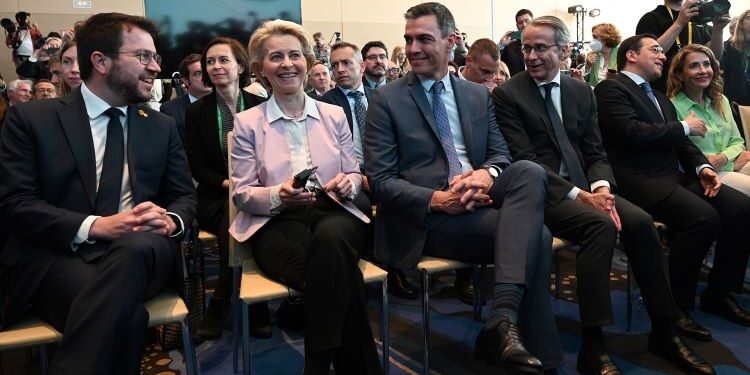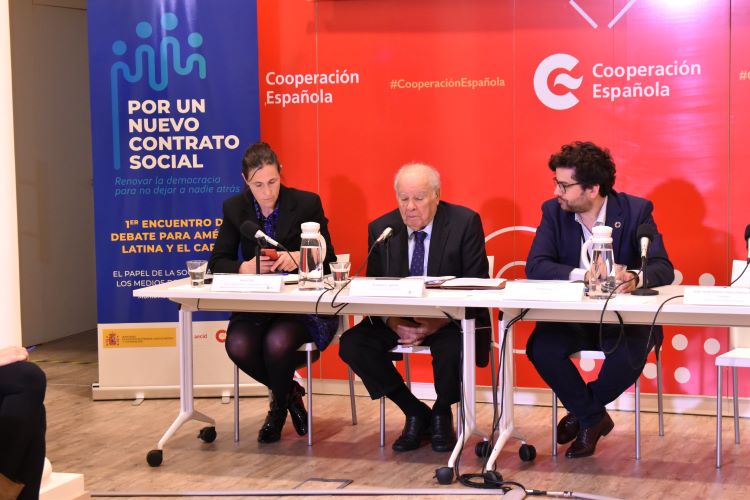The Diplomat
The President of the Government, Pedro Sánchez, and the President of the European Commission, Ursula von der Leyen, yesterday defended the speeding up of interconnections between the Iberian Peninsula and the whole of Europe in order to reduce energy dependence on Russia and undermine Moscow’s ability to “finance this war”.
“The turbulences will pass and what will last will be Europe”, said Pedro Sánchez during the closing of the XXXVII Annual Meeting of the Cercle d’Economia in Barcelona, at which he presented the II European Construction Award to Ursula von der Leyen and which was attended by the Minister of Foreign Affairs, José Manuel Albares; the Minister of Transport, Mobility and Urban Agenda, Raquel Sánchez; the Minister of Culture and Sports, Miquel Iceta; the President of the Generalitat de Catalunya, Pere Aragonès; and the President of the Cercle d’Economia, Javier Faus.
“The turbulence will pass and what will last will be Europe,” said the head of the Executive. “The Spanish economy is responding solidly (…) despite the war in Ukraine and also the still adverse and permanent effects of the pandemic on our economy,” continued the President of the Government, who recalled, in this regard, that the Executive has approved a package of measures to help the sectors affected by the war.
These measures, he stressed, are complemented by the agreement reached by Spain and Portugal with the European Union to lower electricity prices, after both countries sent their joint proposal yesterday. “After arduous weeks of technical negotiations, Spain and Portugal sent Brussels the joint proposal for the electricity price cap mechanism that we trust will be the definitive one,” he explained. “We hope to soon have the preliminary approval of the European Commission to be able to implement it over the next few days,” added the President of the Government.
Likewise, Sánchez also defended the need to advance in energy autonomy through market reform and the commitment to renewables. “Spain can and wants to be a hub for the production of green hydrogen throughout Europe, but what we need is to speed up the interconnections between the Iberian Peninsula and Europe as a whole,” he warned.
For her part, Von der Leyen stated during the event that, although “COVID-19 has not disappeared,” the pandemic “resonates like a distant echo.” “Yet once again, thousands of innocent people are dying right here in Europe because of the Kremlin’s aggression against a peaceful country. And it is not just the future of Ukraine that is at stake, attempts are being made to tear down Europe’s security architecture,” she warned. “There is only one way to help our Ukrainian friends win this war and be the masters of our own future,” the EU president continued. “This is Europe’s moment,” she assured.
“We are harnessing the true power of our Union. We did it, firstly, with our vaccine strategy. Second, came NextGenerationEU. And now, with our unprecedented sanctions on Russia and our determination to wean ourselves off our dependence on Russian fossil fuels,” she continued. “Now all of Europe agrees that we must reduce our dependence on Russian fossil fuels, as a matter of urgency,” and so “last month we presented a new plan, called RePowerEU, to replace 150. billion cubic meters of Russian gas, the amount of gas we imported last year from Russia, and I have reached an agreement with (U.S.) President (Joe) Biden for the additional supply of 50 billion cubic meters of liquefied natural gas starting next year,” an amount that “will replace one-third of Russian gas,” she announced.
“Spain has built over the years a resilient energy system, based on its own renewable energies and a diversified network of energy suppliers. You have the largest regasification capacity in Europe, and you have already become the leading hub for liquefied natural gas from Africa and the Americas,” Von der Leyen stressed. “We are redoubling our hydrogen targets, which could replace another third, and we will privilege cross-border projects, for example, the crucial connection between Portugal, Spain and France, because together, we can free ourselves from Russian threats and, as a Union, we are undermining Russia’s ability to finance this war,” she asserted.







